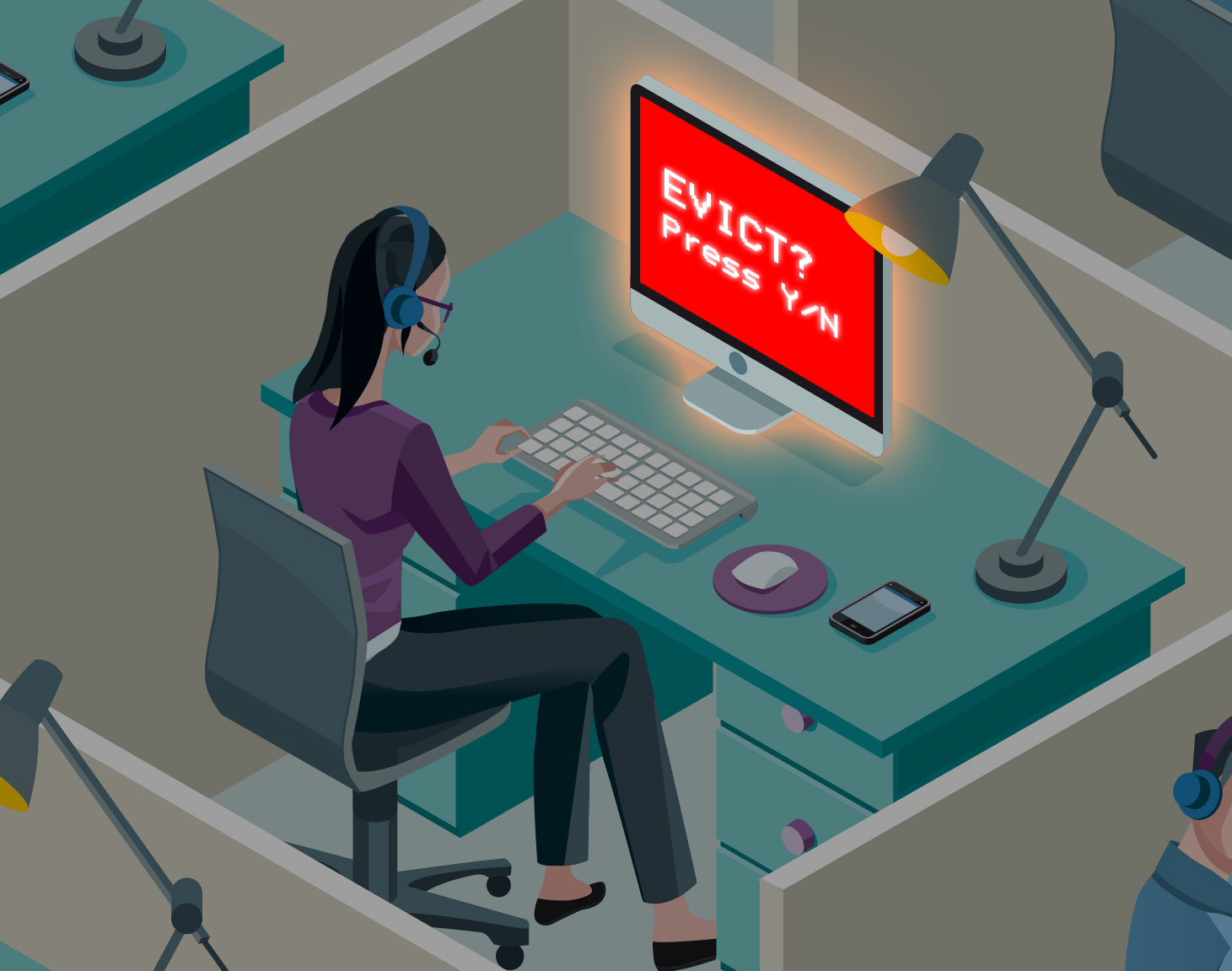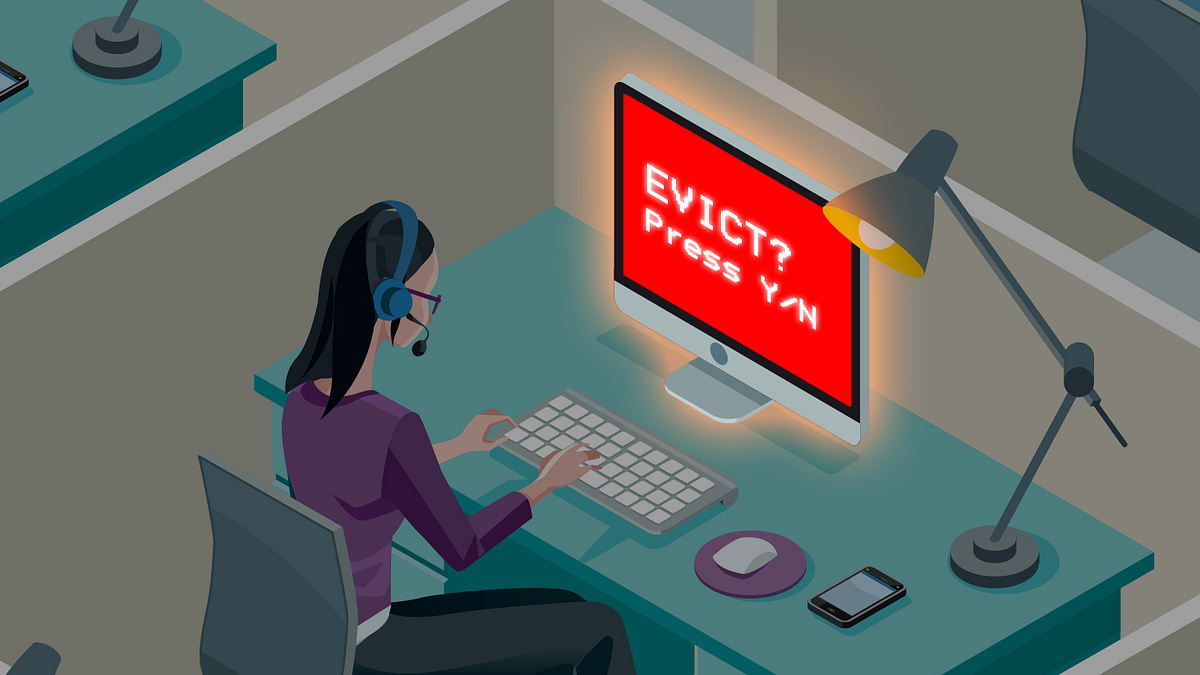Anonymous

It all started with a phone call to my father. I explained to him that I was unsatisfied with my life and that all my grand ambitions had materialized into me serving pizza to rude customers five days a week. In short, I was broke and wanted a better job. To my surprise, my father told me that he “knew a guy” who might have a job opening for me. The next thing I knew, I was a professional debt-collections agent.
Initially, I was excited. My new boss told me I’d be making at least 28K and mentioned that some “go-getters” at the company can make upwards of 50K a year due to commission. While that may not sound like a huge sum of money to some people, to an academically indecisive 20-year-old, working part time at Round Table Pizza, this marked first time in my life that I felt like an actual adult, rather than a glorified teenager on the verge of legal alcohol consumption.
The first few calls went like this: I sat down. Booted up the auto-dialer. I made the calls, then got yelled at and hung up on. I didn’t feel necessarily fulfilled, but it was better than being on my feet making pizza all day.
My first day as a collections agent was fairly boring. I shook hands, signed paperwork, learned the basics of the company software and got situated in the cubicle that had been assigned to me.
The first few calls went like this: I sat down. Booted up the auto-dialer. I made the calls, then got yelled at and hung up on. I didn’t feel necessarily fulfilled, but it was better than being on my feet making pizza all day.
This went on for a while, until, a few weeks into the job, I had my first case where I empathized with the client.
I called an old lady who had refinanced her home in East Palo Alto before the housing market had collapsed. While I explained to her that she would be facing foreclosure if she couldn’t afford to maintain a payment plan, she started weeping. I felt incredibly uneasy. I tried to tell her how sorry I was, but she kept sobbing.
Collections plans are designed to keep the debtor in debt as long as possible through escalating interest rates, thus establishing a consistent flow of money for the banks and the collection agencies.
Although her situation saddened me, there was nothing I could do. I told her, “I’ll see if we can come up with a plan that would be a better fit for your fixed income,” but I knew her situation was unlikely to change.
That’s because even if she did reach a payment plan, it wouldn’t be the end of her troubles.
Collections plans are designed to keep the debtor in debt as long as possible through escalating interest rates, thus establishing a consistent flow of money for the banks and the collection agencies. I don’t know the outcome of her situation after I hung up, but it is likely she was foreclosed upon, like so many others.
Most people who find themselves in serious debt don’t know their rights, nor the realistic penalties, so we are encouraged to bend the truth to secure payments.
The old lady’s story isn’t uncommon in the slightest. I’ve talked to thousands of people just like her, and it’s my job to convince them to pay.It doesn’t matter that I feel like everything I’ve done at this job is completely at odds with who I am as a person. I wake up every morning and attempt to justify the constant betrayal of my ideals for a paycheck.I try to associate it with getting older. It doesn’t help.
Most people who find themselves in serious debt don’t know their rights, nor the realistic penalties, so we are encouraged to bend the truth to secure payments. My team leader (basically my supervisor) continually reminds us collections agents that it’s fair game to exaggerate how the debt could affect their family in the future or to allude to their future homelessness. Though we can issue these sorts of mild threats, we are not allowed to do so in an aggressive manner — anything that could be legally defined as a direct threat is prohibited.
Rather, at our bimonthly team strategy meetings, the supervisors emphasized that we should sound like a concerned friend. For example, if a debtor says something like, “I don’t think I can continue with the payment plan. It’s just too much!” the collections agents’ script tells us to say something like, “I completely understand, and I’ve been in a similar position myself, but I’m going to be honest with you, you gotta think about making some adjustments. You don’t want this dark cloud over your head. This can have negative financial consequences not only for you but for your family too. I’m going to talk to my supervisor and see if we can make some adjustments.”
You’d be surprised by how often that line works.
The better I got at my job, the more money I made, and the worse I felt. If you set up a payment plan, which is what the company prefers, you get 5 percent commission on every payment. If they pay in one lump sum (which is very rare), you get only 1 percent. Hence, we are incentivized to keep them in debt for as long as possible. The commissions can add up quickly, and last year I made around 40K. It was a lot of money for me. I was only 24 and making more money than some of my friends’ parents, but it was still bittersweet.
I’m nothing special. I have only a high school education, and I sit in a cubicle all day making multinational banks more money. Nothing I do helps society. I’m a mouthpiece for an oppressive system that puts profit before human needs. I always tell my friends that if they want to develop a hatred for capitalism, they should consider working in collections.
And I’ve undoubtedly developed a hatred.







